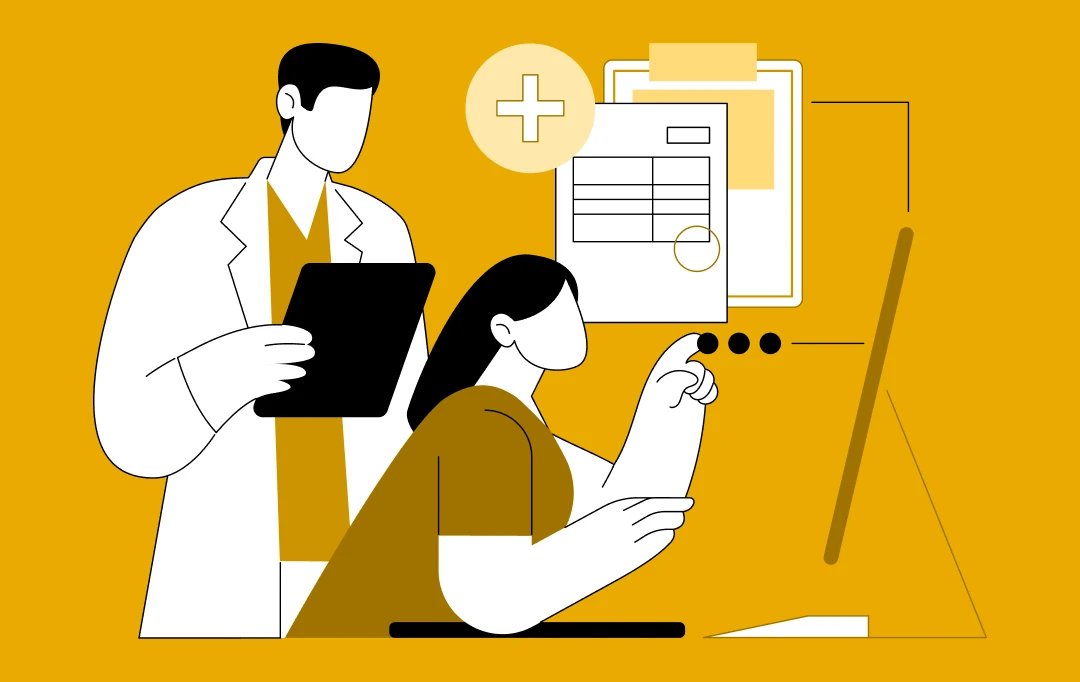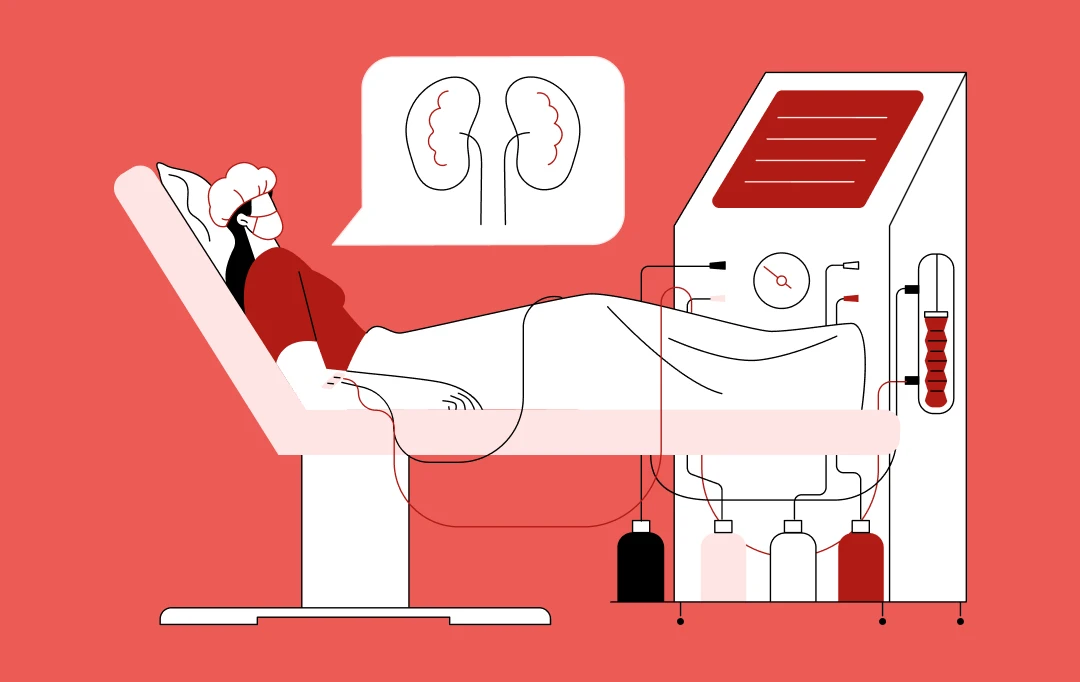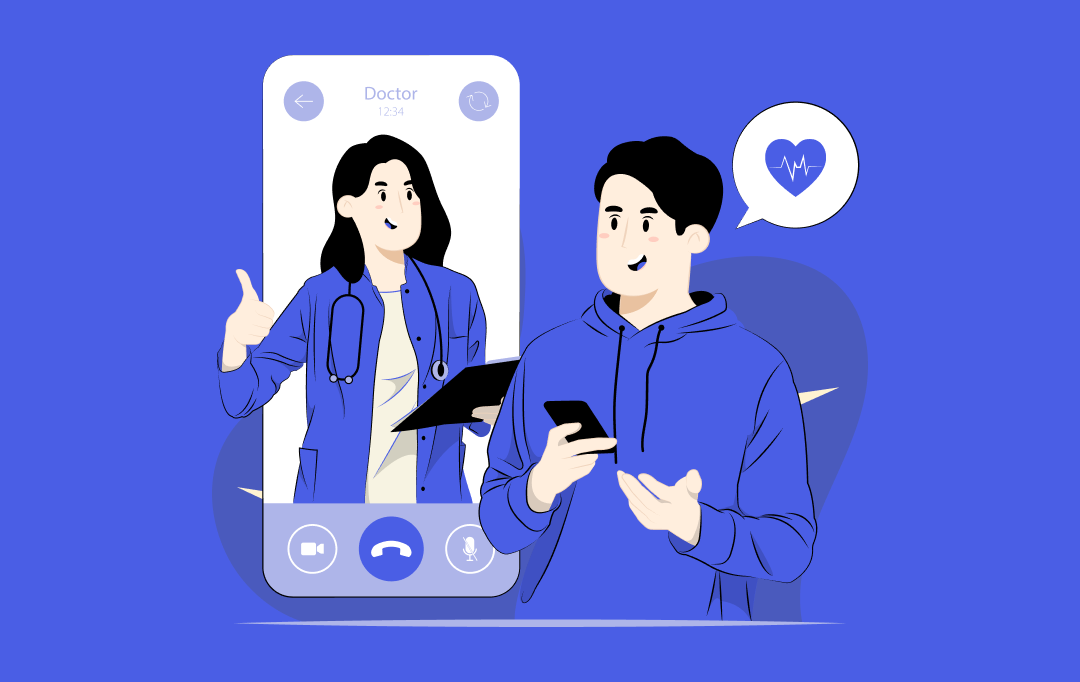- Automation Trends in Healthcare and Outlook of the Healthcare Automation Market
- How to Get Started with Automation for your Healthcare Business?
- How does Robotic Process Automation in Healthcare work?
- Advantages of RPA in Healthcare Industry
- Application of RPA in the Healthcare Industry
- 1. Claims Processing
- 2. Appointment Scheduling
- 3. Payment Processing
- 4. Compliance Management
- Top Benefits of Getting Intelligent Automation in Healthcare
- 1. Speed and Precision in Diagnosis
- 2. Fewer Errors
- 3. Better Communication
- 4. Higher Patient Satisfaction
- 5. Early Detection of Diseases
- 6. Easy Access and Transfer of Data
- 7. Paperless Activities
- 8. Improved Patient Care
- 9. Efficient Handling of Emergencies
- 10. Data-Driven Insights
- Future of Automation in Healthcare
- Map Out your Journey to Success with a Healthcare App
- FAQs
The advent of automation has revolutionized several industries, including healthcare. But sadly, the adoption of automation in healthcare industry has been slower, primarily because of the vendor’s frequent misuse of the term. Although the manual, paper-based processes lie at the core of every healthcare center’s everyday work, it actually slows down the efficiency.
This has caused a range of critical errors and has put the compliance of healthcare service providers at risk. The inefficiency of healthcare operations has always resulted in the wastage of time and resources of the employees on the paper-based routine.
Thus, with the implementation of healthcare automation, healthcare units can replace their labor-intensive task with smart digital processes and rapidly improve the efficiency of their medical unit. Eventually, this results in the patients receiving better healthcare services as staff gets released from intense administrative work. Automation in the healthcare industry is, therefore, making the procedures more productive and worthwhile.
Automation Trends in Healthcare and Outlook of the Healthcare Automation Market

The growing demand for process automation and data centralization is currently propelling the global healthcare automation industry towards growth. Furthermore, various automation aids are consistently emerging in the healthcare sector for monitoring real-time data along with the provision of real-time doctor and equipment location.
Also, the upsurging government investment and initiatives in the healthcare sectors and the growing demand for healthcare software development services are also the major factors contributing to market growth. The healthcare automation market is projected to grow at a CAGR of 8.4%, reaching a valuation of $88.9 billion by the end of 2028.
Read- Key Healthcare Trends that will Redefine the Industry in 2022
How to Get Started with Automation for your Healthcare Business?
Healthcare providers are now required to streamline processes for improvising their services by implementing innovation. The first and foremost thing that you need for healthcare automation is to identify the most vital, time-consuming, and expensive healthcare operations. These processes mainly impact the patient’s experience and whose completion time needs to be reduced significantly.
Identify those with these two questions:
- Which processes should be automated first?
- Which healthcare operations consume more time?
Certain processes are complex and cannot be finished quickly. Here, the automation solution plays a major role in cost-efficiency and time-saver for the entire process. Modern healthcare workflow automation solution allows users to
- Collect and transfer data between various systems.
- Create and customize their medical template
- Setup notifications for their patients
- Allow patients to fill their medical forms online
- Process payment documentation faster
How does Robotic Process Automation in Healthcare work?

Robotic process automation in the healthcare industry might sound rocket science, but it is not. Robotic process automation is all about the utilization of the pre-programmed software agents or ingenious bots that inhabit insurance, accounting, laboratory, information, and, most importantly, patient engagement systems.
RPA in the healthcare industry and its solutions can ease down the tedious back office task and free the healthcare workers to engage in more meaningful doctor-patient interactions and other diagnostic works.
In particular, intelligent software agents are very good at manipulating, data processing, transactions, conversing with internal and external IT systems, and triggering responses. Robotic process automation can thus be configured to perform event-driven tasks.
Advantages of RPA in Healthcare Industry
Healthcare organizations have significantly benefited from implementing RPA into their day-to-day activities. Here is the list of advantages that RPA in the healthcare industry has:
- Reduction in the cost of healthcare administration by automating repetitive tasks that are resource-intensive and time-consuming.
- Improve the data accuracy task and reporting in different clinical stages by eliminating human error.
- RPA ensures that the task output enables organizations to successfully put their best practices in place.
- RPA in the healthcare industry increases the speed of the processes, for example, the automation of various mundane activities.
- It improvises the productivity of the healthcare personnel with healthcare automation solutions that do not require human intelligence, thus freeing the resources for complex activities.
- Improvises the patient experience with better and consistent care because of better visibility across the entire patient record.
Application of RPA in the Healthcare Industry
The RPA scenes in the healthcare industry can range from auto-generating replies to supporting single-click installation of any complex software system. Below is a rundown of the most important RPA applications or use cases in the entire healthcare setup.

1. Claims Processing
Healthcare automation and digitalization have made the processing of health insurance claims easier and error-free. Surprisingly, it only takes 85 seconds for the healthcare workers to check the status of a patient’s health insurance claim. Care1st Health Plan Arizona is one such use case that has reduced the time required to process one claim from 20 seconds to just 3 seconds.
Another example of utilization of RPA healthcare comes from Avera Health. The organization implemented RPA bots to check the users’ account status and notify other Avera managers about incomplete or pending claims. By doing so, they were able to save $2,60,000 in employee costs. As per Mckinsey, RPA in medical claim processing promises a reduction of 30% of claim processing cost.
2. Appointment Scheduling
Before the pandemic struck, almost 88% of appointments were manually booked, thus extending the gap between the actual visit and the initial referral by up to 2 months. As per the US healthcare providers, missed appointments cost them an astounding amount of $150 billion annually.
By implementing RPA medical bots into the patient engagement and appointment scheduling software, hospitals have now eliminated the manual data entry process and improvised the patient no-show rates.
3. Payment Processing
RPA is a kind of business process automation in the healthcare sector that streamlines all the processes by eliminating human intervention. The RPA solution in healthcare billing typically works with medical coding system and claims management. To receive reimbursement from the insurance companies, the healthcare service providers need to find various data, including the disease and drug codes and entries from the patient’s entire medical history.
In addition to automating the healthcare processes like data entry and aggregation, the RPA medical tools offer complete pricing transparency to the patients. For instance, Baylor Scott & White Health (BSWH), a healthcare institute that currently serves 52 hospitals across the US, has recently introduced a claim evaluation mechanism that is driven by Artificial Intelligence and RPA.
With intelligent RPA bots, the hospital now manages to supply 70% of estimates without any human intervention. Check out the statistics below to understand how AI has been rapidly adopted in the healthcare sector in the past few years.

4. Compliance Management
Ensuring compliance with the standard legislative acts and regulations of patient healthcare information management is a matter of great profitability and reputation. The HIPPA charges penalties that range from $1000 per small accident to $100,000 for serious breaches.
The RPA medical tools can help in compliance checking and role-based access control by hard coding. This prevents unintentional and intentional data breaches along with maintaining a detailed record of activity logs for accurate security audits.
Also Read- How Can Your Healthcare System Become a Digital Health Leader?
Top Benefits of Getting Intelligent Automation in Healthcare
Automation is all about reimagining the healthcare system by enabling various efficiencies that would be impossible to work on manually. Let’s check out the following list of benefits that automation in healthcare offers:

1. Speed and Precision in Diagnosis
Time is very crucial in diagnosis, especially when it comes to serious illnesses. Delay in the diagnosis puts the patients at risk of getting worse or succumbing to the particular disease. Also, often the healthcare workers, while trying to expedite the process, make blunders, resulting in inaccurate results.
However, bringing the automated diagnostic process into the system can improvise the speed and also the precision. What’s more? Automation also helps detect the patient’s deviation from the regular care plan, thus making it easier for the physicians to intervene in real-time.
At Appinventiv, we worked on a multi-request format platform known as YouCOMM, meant for the in-hospital patients to connect with the healthcare staff, especially nurses, to get help with their basic requirements. This amazing customizable patient messaging system enables them to notify the nursing staff about their requirements in three kinds of request creation, one by using hands where the patients would get to choose the option at their fingertips, second by voice command, and third by head gestures.
There is also a child mode where the application will send children specific emergency alerts. Although YouCOMM as a product has been launched at a beta stage, it has received a lot of positive recognition. The app was also awarded the Entrepreneurs Innovations Award in 2019. This kind of healthcare application bridges the yawning gap between doctors and patients, as now they would get timely checkups and additional healthcare facilities while being admitted to the hospital.
2. Fewer Errors
Silly mistakes in healthcare provisions can be life-threatening or costly. Healthcare workers are often bound to commit mistakes due to inattentiveness or fatigue. But this isn’t the case with automated machines. Automation helps reduce errors as it minimizes the process of a human element, thereby resulting in more effective and better treatment.
Medical automation solutions are now also improving administrative operations. Sharing data between multiple systems has now become even more streamlined because it provides complete insight into the processes. A computerized platform that is completely streamlined leaves no room for blunders.
3. Better Communication
Automation in the healthcare industry also boosts the communication between healthcare providers and patients. For instance, often, the patient forgets their appointment dates and end up missing their appointments. However, with an appointment reminder, the patients can visit the healthcare centers on time as they would get a direct notification.
On the other hand, it also becomes easier for the healthcare providers to check the patient’s appointment dates, confirmation, and cancellations, which reduces much of the hospital waiting time. It also enables stations to get proper healthcare at the right time, thus lessening health complications.
Bonus Read- How Internet of Medical Things Impact the Healthcare Industry?
4. Higher Patient Satisfaction
There are different factors that impact the complete satisfaction of the patients in the healthcare system. For example, the ease of scheduling appointments, the type of treatment or diagnosis being received, and other factors are critical when it comes to keeping the patients satisfied.
Another major factor that is mainly dependent on satisfying the patient is the total time required for booking an appointment and the wait time on that particular day. Automatic healthcare processes allow medical organizations to improve their patient experience in numerous ways.
For example, they can go for implementing software that would send text messages or notifications to the patients for scheduling or re-scheduling their appointments if they can no longer make it.
With the help of advanced scheduling software, patients can now schedule their appointments at their preferred times slot through their mobile device or computer at any hour of the day. This gives them the freedom of choosing their own appointment time and slot as per their convenience.
5. Early Detection of Diseases
The automated health systems help the patients in the early detection of diseases in many ways. It allows the patients to go for early treatment that hinders the progression of disease in their bodies. With AI automation in healthcare, it becomes easier to determine what kind of disease the patient is carrying in their body.
For example, the neural network can easily detect the early stages of lung cancer. With all the benefits of AI automation in the healthcare industry, patients can now relax and get their illness detected at an early stage and prevent it from further growing.
6. Easy Access and Transfer of Data
Many healthcare facilities are now automating their process of accessing and transferring patients’ data. This type of healthcare automation solution instantly adds the patient’s data to their hospital or healthcare center’s database once it is collected. Perhaps, this is the reason why your hospital needs a mobile application as it would allow the ease of sharing data between various departments.
The health expert can store all the data rapidly, access the data as per the requirement, and share it with the patient or other doctors. The information will allow them to make exact medical reports, differentiate the patient’s advancement, and settle on the best clinical decision without any hassle.
7. Paperless Activities
Healthcare institutions generate a considerable amount of referrals, slips, reports, and files. Handling this volume of paper incurs a lot of logistical, administrative, and financial costs. Healthcare automation facilitates cataloging and standardization and enables the features of digital signature that previously used to be done manually.
Documents are shared in the cloud that can be accessed by other healthcare staff and can speed up the patient care process. Healthcare automation has promoted the scalability of the critical business process through the application of cloud computing in the healthcare system.
8. Improved Patient Care
Hospitals are all about patient care, and it needs to be more comprehensive care and attention. In smart hospitals, right from taking the patient through medical procedures to complete recovery, all the healthcare activities are composed of efficient techniques.
All this is only possible because of the safe machinery and instrumentation equipped with quality and technology. Automation in hospitals eliminates problems like the failure of medical equipment and compromising the quality of healthcare services with an aim to improve quality patient care services.
9. Efficient Handling of Emergencies
Healthcare systems have now started to leverage automated solutions for adjusting the sudden changes in patient volume, especially the utilization of the emergency rooms. With the automation feature, a healthcare organization can easily predict the time they need to increase their staff members during certain seasons, for example, flu.
Automated solutions emerge as a boon since patients can now have messaging solutions so that they can communicate with the healthcare facilities and handle emergency situations effectively.
10. Data-Driven Insights
Technology utilized for automated healthcare processes can deliver a wealth of data in a continuous feedback loop that can be used for improving performance. With each cycle, the healthcare automation system collects data on how the processes are working and uses that information to improvise the programs. Overall data analytics in healthcare helps in understanding the workflow and reducing the team’s workload.
Also read- How can automation be used to ensure security and compliance in business?
Future of Automation in Healthcare
The automation in the healthcare industry has completely improved service delivery; hence doctors have additional time for their patients and later utilize the best-automated solutions to get their treatment on time. Automation is, thus, the future of healthcare as it will be completely taken over by technology.
With the Electronic Health Record (EHR) system, a large amount of data are produced on a regular basis, where handling patients and their data has become even faster and easier. With better advancements in healthcare technologies, robots will be performing surgeries
Needless to say, the impact of automation in healthcare is immense. (AI)-enabled medical devices, telemedicine, and blockchain electronic health records are just a few examples of how digitization has reformed the healthcare industry.
For example, the rise of on-demand healthcare services has made it easier for patients to book an appointment with a doctor, choose any specialist, or get medicines delivered to their doorsteps.
Also Read: 17 Innovative Healthcare Business Ideas for Startups and Aspiring Entrepreneurs
Map Out your Journey to Success with a Healthcare App
Whether you are a healthcare entrepreneur, medical professional, doctor, or someone who runs a hospital or wellness center, you should definitely grab this opportunity to create an intuitive healthcare application development. Offer your users a unique software solution that would bridge the yawning gap between the healthcare service providers and the patients.
By leveraging the best automation techniques, users can now skillfully leverage user-friendly healthcare software solutions. This enables the users to get access to a wide range of healthcare services. Therefore, it is essential to find the right software development partner who can develop amazing healthcare software.
At Appinventiv, we offer robust technological solutions—from providing AI chatbot development services to delivering software and mobile solutions for the entire health and fitness industry. Our end-to-end healthcare software development services aim to improvise clinical outcomes, quality care, user satisfaction, and clinical efficiency. Got a healthcare software idea in mind? Get connected with our healthcare software development experts today.
FAQs
Q. What is automation in the healthcare industry?
A. Automation in healthcare involves the utilization of various software that promotes efficiency in the entire range of medical services. This kind of technology employs various modern techniques and advanced tools for streamlining healthcare services.
Q. How does automation affect healthcare?
A. Automation has highly influenced healthcare services as both patients and doctors or healthcare service providers can get their job done efficiently. Here are a few key pointers to how automation has affected the entire healthcare industry.
- It has optimized efficiency in the medical processes
- Ensured better customer satisfaction
- Improved the productivity level of the healthcare staff
- Promoted better support for the patients
- Helped in faster data transfer
Q. Is automation really beneficial for providing quality healthcare services?
A. Automation in healthcare can overall improvise the consistency and quality of healthcare services to a great extent. It is known for reducing the chances of human errors, thus offering an exceptional level of medical services. The list of benefits of automation in healthcare include:
- Faster data retrieval
- Quicker billing
- Improved medicine ordering
- Early disease detection
- Precision in medical diagnostic
- Quality healthcare services
- Less space for human errors
- Safer and advanced treatment solutions
Q. How intelligent business automation can power the future of the healthcare industry?
A. The implementation of intelligent automation in healthcare is now not an uncommon scene in healthcare centers anymore. Statistics show that the global market size for the utilization of artificial intelligence in the healthcare sector has gradually grown over the past decade. It is estimated that the market will increase and will reach a valuation of $28 billion by the end of the year 2025.
The acceleration of digital and virtual access to care in response to the ongoing pandemic, combined with other emerging and pre-existing digital touchpoints, is powering the future of automation in healthcare. Although there are challenges, the gradual embracing of new-age digital technology will prove to be the key to addressing various healthcare concerns and meeting long-term goals of quality care.
Q. What are some of the common examples of automation in healthcare?
A. One of the greatest boons of all time that the healthcare industry has been gifted with is automation. Here are some of the best examples of automation in healthcare:
Automatic patient reminders system: Often it has been seen that the medical support staff spend a lot of time on phones talking with patients, reminding them about their appointments, or letting them know about the lab results. The automated patient reminders systems will send notifications directly to the patients via email, text, or app notifications. This will also allow the patient to choose their preferred time and appointment booking slot.
Continuous Glucose Monitors: Continuous Glucose Monitors, or CGM, are one of the most effective examples of automation in healthcare. The CGM was originally made for Type One Diabetes, but with the recent development, it is now being utilized for Type Two Diabetes as well. This helps in increasing the quality of life of diabetic patients.
Chatbots for assisting healthcare professionals and patients: Chatbot have simply replaced the intervention of humans for communication. Although, it cannot replace the doctor’s expertise, it has taken over much of patients’ care. These in-built bots are now helping them to find answers to their queries or book appointments, make payments or collect follow-up post-care information.


- In just 2 mins you will get a response
- Your idea is 100% protected by our Non Disclosure Agreement.

Healthcare IT Outsourcing: Key Benefits, Best Practices, and Implementation Process
Key Takeaways Reduce Costs by 30-40%: Convert capital IT expenses to predictable operational costs, eliminating the need for large in-house teams and infrastructure. Focus on Core Patient Care: Free up internal resources from IT management to concentrate on core healthcare services, innovation, and growth. Ensure Compliance & Mitigate Risk: Leverage expert partners to navigate HIPAA…

How AI-Powered Virtual Health Assistants Are Enhancing Remote Patient Monitoring
Key takeaways: Remote patient monitoring has the potential to reduce hospital readmissions by up to a quarter, shifting healthcare from reactive to proactive care through continuous, real-time health tracking. The U.S. health intelligent virtual assistant market is expected to reach $1.87 billion by 2030, driven by the growing demand for continuous care, virtual consultations, and…

Why Telehealth Security is Non-Negotiable for Patient Trust and How to Achieve It
Key takeaways: Telehealth security is crucial for patient trust and the continued adoption of digital healthcare services. The rising tide of cyber threats, from ransomware to inadequate authentication, poses significant risks to patient data and provider reputation. Implementing robust security measures like end-to-end encryption, multi-factor authentication, and regular audits is non-negotiable. Compliance with regulations like…


















